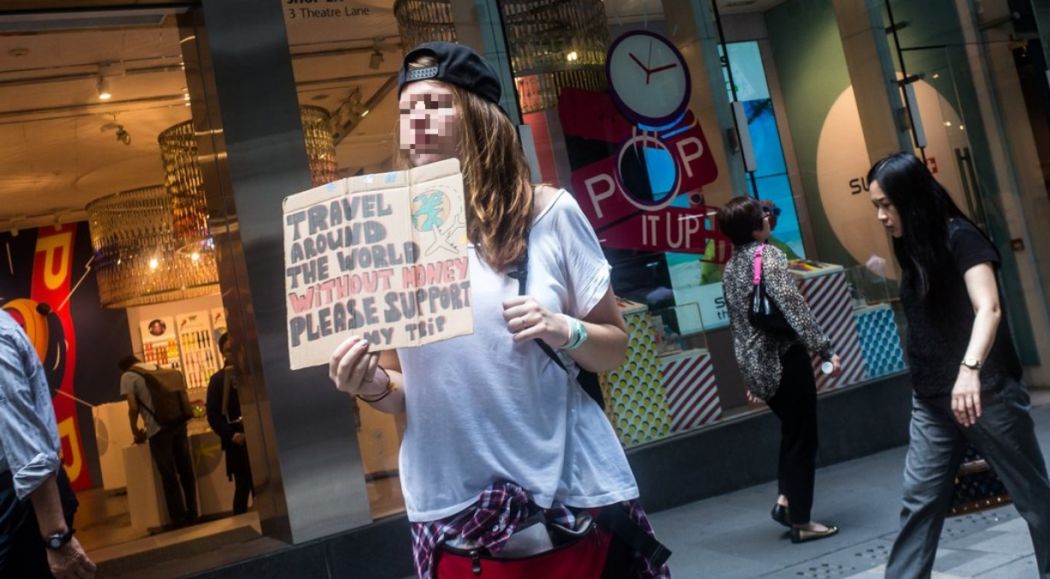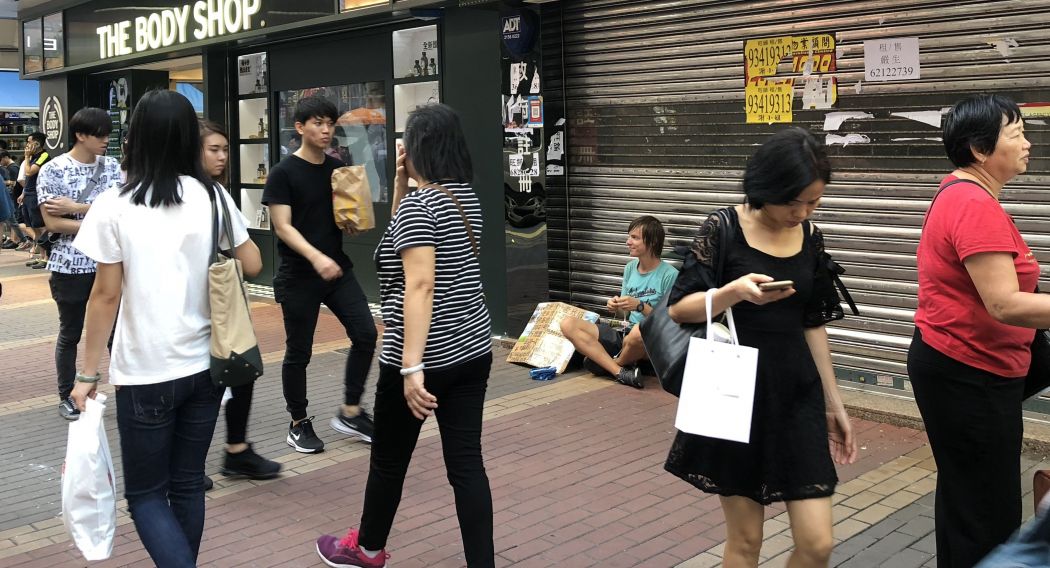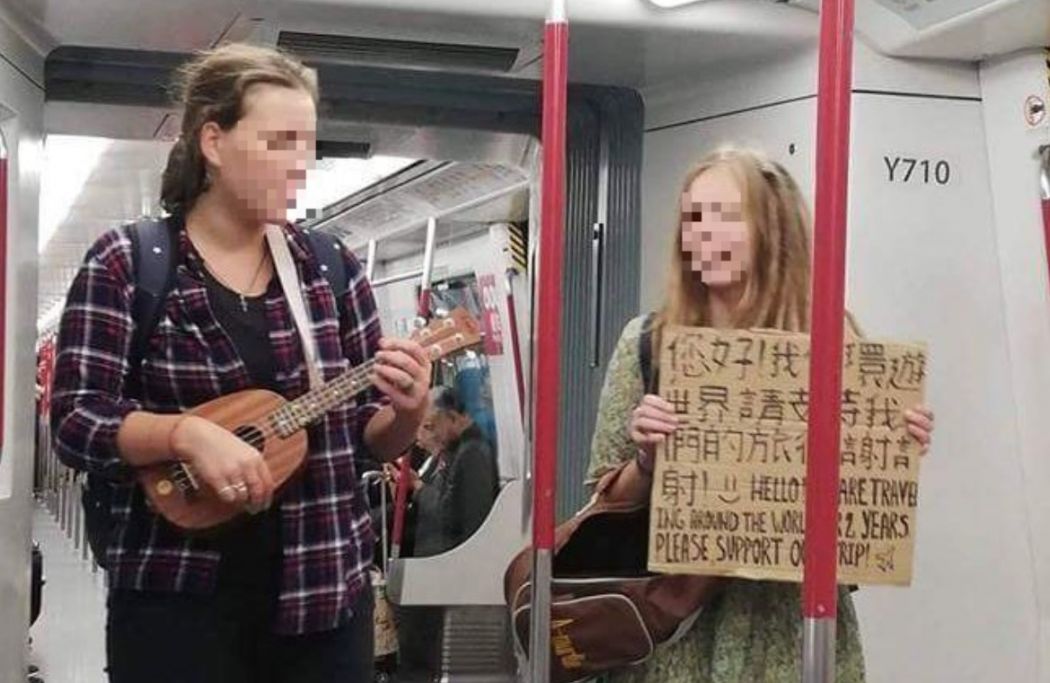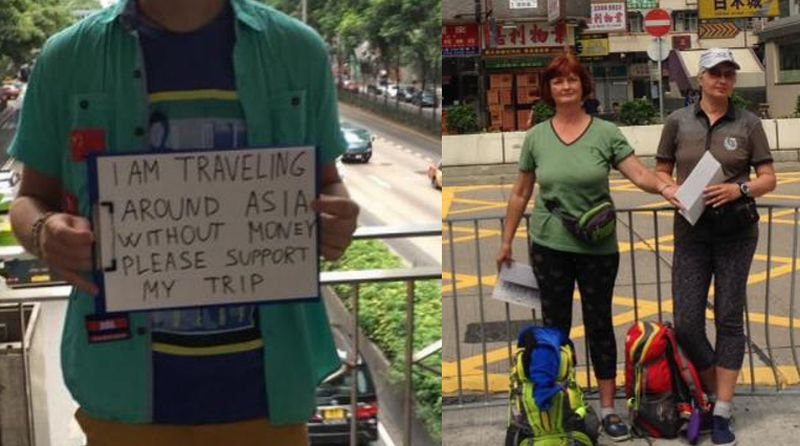Recently, the internet has been relatively free of indignant articles, Instagram posts, and Twitter rants about “begpackers” in Hong Kong. The social media-besieged beggars may have got the hint from last year’s storm of social media rage. Or people may have simply moved on.
Some in the backpacking world tell HKFP that growing public mistrust of their “need” has narrowed the feasibility of getting by on alms.
Begging on public streets is illegal in Hong Kong, punishable by a maximum fine of HK$500 and a year behind bars. According to police data, arrests related to begging in public have decreased by over 40 percent since the number peaked in 2016.

Fewer than half as many non-mainland Chinese citizens have been arrested for begging so far this year compared with 2017. Police data do not break down arrests by ethnicity.
Virginia Wong, a vendor at the Star Ferry market, says she has seen fewer begpackers this year than in previous years: “There were many young people asking for money here, who said they were from Moscow,” says Wong.
“I have seen fewer this year. I think Chinese people don’t want to give them money because they think that if they want to travel, they need to save first. I save for a year when I want to go somewhere, so why would I give to them?”
Within the backpacker community, there is often talk of the “Russians” – or if you are asking a Russian, the “Ukrainians” – who scribble out signs that detail the hardships that led to their itinerant begging.
“People here are not stupid” says Elena, a Hong Kong resident who arrived here from Russia 20 years ago. “They will know when they are being taken advantage of and it will not go on,” she told HKFP.

Popular Russian travel videoblogger Aleksander Vinogradov wrote in a post about begpackers in Hong Kong: “Of course, all this will not end at once; just two years ago it was possible to pick up a lot of money at the click of a finger, now it takes more effort than simply to print the pictures and look like a sad shit.”
Mark Ryanda, a backpacker from Belarus, spent two weeks in Hong Kong frequenting hostels and campgrounds last month. He says begpacking is not what it used to be. He has made around HK$150 in two hours, sitting on a sidewalk in Mong Kok with a sign detailing his travels in Chinese.

“I’ve heard the heyday has passed, that two years ago you could make much more,” he told HKFP.
The “liars,” Ryanda says, are ruining the very possibility of asking for help. Ryanda says that when he arrived in Vietnam, prior to Hong Kong, a taxi driver ripped him off and took around US$400 from him. “That was all I had,” says Mark. “I had a choice to go home, or see if I could get by.”

Ryanda has made cash here and there playing music in China, re-selling a motorbike in Cambodia, and yes, asking for funds on a sidewalk in Mong Kok. When asked if he thinks it is a disrespectful thing to do, he said: “Maybe it is; I am not sure. It is up for people to decide for themselves. I only know that I do not mean to be disrespectful”.
Belarus is not a rich country. And although Hong Kong has cage homes and a reasonable standard of living is hard-won for many, there is – in contrast – immense wealth in a city where one in 38 residents is a US dollar millionaire.
Data from the International Monetary Fund’s 2017 report ranked Hong Kong the 10th wealthiest territory in the world per capita.

The wealth gap in Hong Kong, however, has reached all-time highs in recent years with the highest income households earning 44 times that of Hong Kong’s poorest. However, the relative sparseness of homelessness reinforces the city’s appearance as a prosperous financial hub – Asia’s international city – where the idea of asking for spare change on the street does not seem so preposterous to young eastern Europeans.
A begpacker named Maxim featured on the Russian site Kursk Izvestia details how he survived in Hong Kong for two and a half months “streeting” as it is referred to in Russian, and modelling. Maxim mentions that there is “no mafia of the poor in Hong Kong” – which means he does not have “competitors to offend” while streeting.

Maxim speaks highly of Hong Kong people and their generosity; he refers to his streeting funding his flight home as a net-positive experience. But there are certainly Eastern European backpackers who disagree with this sentiment, and some of them are adding to the social media barrage of criticism against begpackers.
Vinogradov, the Russian travel blogger who produces videos, articles, and images of his wanderings – flush with budget tips and gear lists, is a vocal critic of begpacking. The video on his YouTube channel Dharma Bums, which has 92,000 subscribers, features Eastern European begpackers in Hong Kong and China as entitled wanderers.

The begpackers Vinogradov interviews are careful to separate themselves from those who abuse the generosity of strangers to max out their time in Hong Kong or who write false claims of misfortune on their cardboard signs.
A young streeter named Lize professes that she thinks it is completely acceptable to ask for money if you run out and need some food or a flight home, but that if you are deceiving people – it is essentially fraud in this “business.”
As a seasoned traveller who funds his adventures with sponsorships and media production, Vinogradov takes a more hardline approach.
“I do not like it because later it concerns me in the way that people in Asia will see white travellers, and especially Russian travellers, differently. This will be reflected in the communication with local people, and later leads to stricter control at the border entrance.”
Vinogradov says that there are rumours among more transient communities in Russia that it is possible to go to Hong Kong and China and beg for money for two years, then return with enough to buy a flat in Moscow.
Lize, the streeter selling photos of her travels for ‘any price’ usually collects a maximum of HK$400 before police arrive. While that amount allows Lize to break even while in Hong Kong, it does not lead to a mortgage anywhere near Moscow, where more affordable houses cost around HK$370,000.

Buskers, who often do not appreciate being lumped in with “streeters,” can make much more. Robert, a saxophone player from Latvia, says he made around HK$1,700 some days playing with a Ukrainian trombonist in China. With that sort of income, purchasing a flat on the outskirts of Moscow might be feasible, but that would likely require busking 365 days a year and a strict policy of frugality in the meantime.
Another Russian travel blogger, Mark Aktiger, differentiates between authenticity and acting a part to evoke pity.
“When people share their happiness, their joy with passersby, it’s OK, but when they start to compromise this idea and they try to live this way – it becomes their occupation – I really disagree with this,” he said.
Elena, the Russian-Hong Kong transplant, recalls an “infuriating” conversation she overheard on Cheung Chau between two begpacker types, “they were saying, ‘one idiot helped me with this, and another idiot helped me with that’ bragging about people who have helped them, and in such a terrible way.”

Her concerns are similar to Vinogradov’s: that such travellers may give people in Hong Kong and China a negative impression of backpackers or of Eastern Europeans in general.
“I think they were Ukrainian,” Elena specifies, “but it doesn’t matter, they are speaking my language – people will assume they are Russian, and that is so shameful towards my country.”
The greatest concern of all, Elena proposes, is that people will abandon the human inclination to help strangers who are genuinely in need.
A backpacker camping at Cheung Sha beach named Alex said that he had only planned to spend a week or two in Hong Kong when his backpack was stolen from a public shower in Wan Chai: “My wallet and my phone was gone, and there is no Ukrainian consulate here,” says Alex, “so I was really on my own.”
Alex, who is a cook back home, spent some time looking for work in a kitchen, but says no-one was willing to hire him short-term. He fell back on streeting while looking for ways to regain access to his bank account.
Alex is planning to hitchhike home: “I’ll go to China, hitchhike to Kazakhstan, then home to Ukraine”.

A plan like this relies heavily on the goodwill of strangers, which Alex says he still believes in despite experiences like having his backpack snatched: “I think the people here are nice people” he says, “I have heard about foreigners doing this as a fraud, but I’ve never met them, and no one has treated me badly for asking for help”.
As Elena says, “the tragedy of it is that the people who do this for the wrong reasons bring our morale down, then we become so sick of this in our hearts, that we don’t trust people who really need our help. It isn’t as simple as it seems.”
